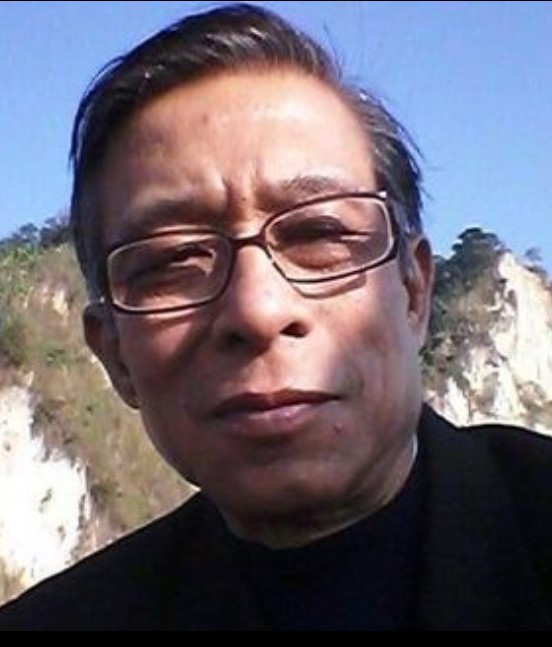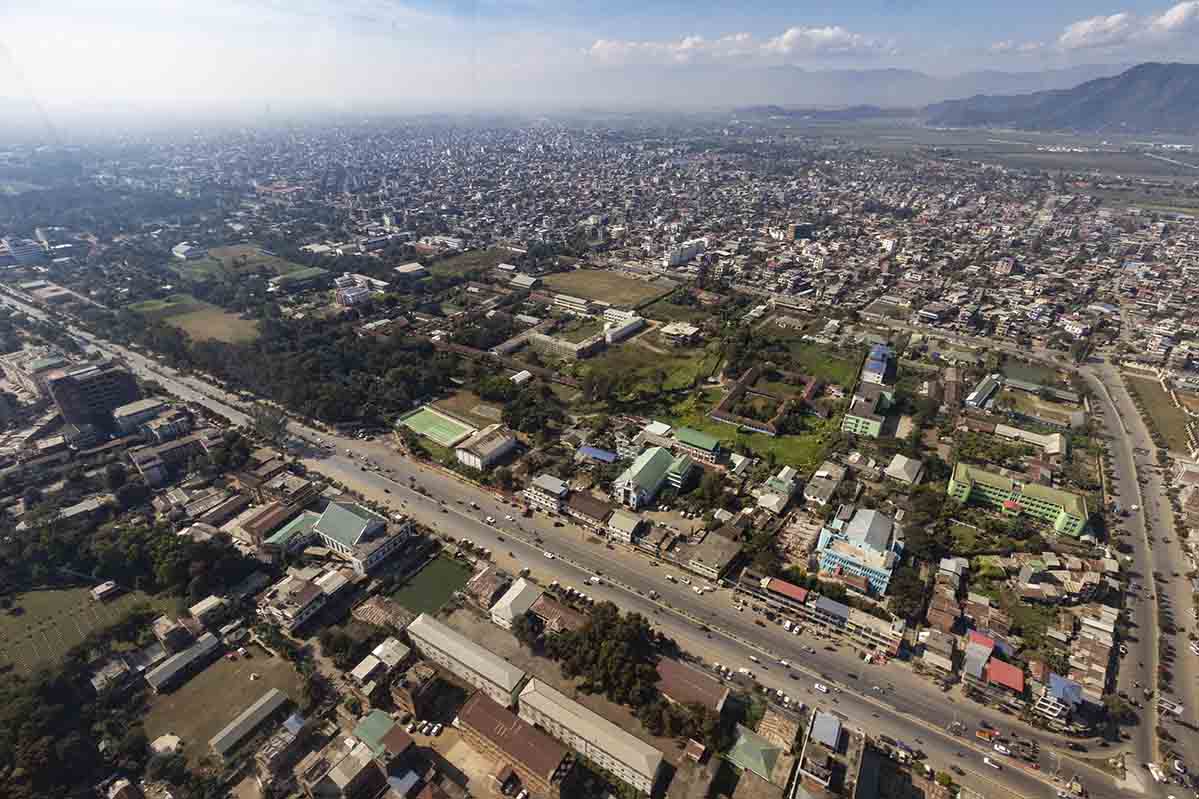Khuman Pali, now also known as Dingko Road is the one and a half kilometer road stretch in Imphal from Khongnang Ani Kaarak on NH02 right up to Lamlong Thong. The areas around it are the Khuman Lampak Sports Stadium Complex, home ground of thousands of sportspersons, and residential areas of Chingmeirong Mamang Leikai, Dewlahland, Kabo Leikai, Laipham Khunou Mamang Leikai, Nagaram, Namdunlong and Tangkhul Avenue, among others. Several parts of these places were paddy fields even in the past few years; in fact, in some parts, many residential buildings continue to have open spaces as neighbours that have deteriorated as paddy fields yet land value has grown extremely high. Drains from these areas largely flow into the Naaga Turel (river) that over time has become a narrow strip of water body sometimes dry in patches due to ever-expanding human needs.
Amidst difficulties arising out of the ongoing Manipur troubles that began in April-May 2023 generally considered ethnic based conflicts were and are still simmering in sinister ways with intermittent firings including rockets and drone bombs, nature or human blunders some say because of what has been done to the traditional physical environment in recent times keep manifesting menacingly. First, there was unprecedented severe hailstorm that lashed several parts of Manipur including the capital city Imphal in early May 2024. Then there was severe waterlogging in the aftermath of Remal Cyclone that suddenly became disastrous floods in late May. Flood came not once but twice in a short span of 45 days first in late May and later in early July 2024 that affected large areas of central Manipur. The areas around Khuman Pali in Imphal were worst affected on both occasions with more than neck deep water in several places.
Khuman Lampak, the area that today house Manipur’s proud Sports Stadium Complex at least until the 1960s, was partly a small lake where a day long annual community fishing, a festival of sort used to take place in the dry season. Participation fee in such annual fishing event in the mid-1960s was Rupee one for a person, man or woman, mostly woman with whatever means, fishing nets generally.
Today the entire length of Khuman Pali is a lively market. Shops of all kinds and service centres – groceries, convenience stores to pharmacies, hardware, garments and footwear shops to boarding houses and eating stations, barbers and grooming and beauty salons and a few stone engravers as well line the road stretch. It also hosts the interstate bus terminus (ISBT), a cremation ground, prominent and easily noticeable earlier now sheltered by small shops with only a gap for its gate, a place of worship or two among the row of shops of household needs. It starts at Khongnang (peepal) ani (two) kaarak (in between) side where the two old peepal trees have long fell in order to facilitate widening of the road even as authorities have since planted two saplings at spots further away from the original places, of course in ardent hope that they would grow into sprawling adult trees. Alongside Khuman Lampak, the market stretches for daily needs of fruits, vegetables, fish, poultry, and meat and a flea market as the road goes further eastward towards Lamlong.
Think of homes and markets ravaged and haunted by never-ending violence and recurring disturbed law and order situation because of the ethnicity based civil strife, battered by hailstorm, and floods. All this came just when the general belief in Manipur of long serpentine queues of cars and two wheelers waiting for a few litres of petrol and diesel at petrol pumps in Imphal were of the past. For long, what came to be called ‘economic blockade on Highways’ have come to define distress generally to express deprivation, political often and/or inadequate and intolerable infrastructure that affect sections of the population and this form of protest when resorted over a longer duration invariably become messy and sometimes violent. Apart from this self-inflicted trouble, topography of the region often makes landslides, rockslides routine in the rainy days.
Buying extra pulses, ensuring that cooking gas cylinders are filled because the first casualties tend to be acute shortage of cooking gas, car fuels are adequate to last days seen as ‘panic buying’ – for good reason have become a habit for many who live in Manipur whenever there are Highway blockades or ravages of the rains inflicting the major roads.
The past one and half years in Manipur have seen everything in excess of what defines hardships. As a result, it has been only to preserve matter and spirit of ones very being. Fear of death is real, more than ever and the worry in this has been because attempting to understand causes and attributes of the violence has been impossible. When humans confront something unknown they often fall on supernatural beliefs if you will.
Then perhaps agnostics also tend to veer towards the unfathomable nature that remains unexplained and not understood even as for the believers it is convenient to say that the Supreme Being will eventually take care of their well-being. When nature manifests, humans respond by invoking experience and science to understand and interpret. However, when the threat is from fellow humans and immediate, you only try to cover and recoil yourself to avoid being affected by such a threat. Wartime bunkers to shelter and have vantage position when required to attack the adversary are there essentially also to recoil. Presently it has therefore been to stay as far distant from what are considered trouble spots where fellow humans, neighbours perhaps in the past are out there to harm.
Yet, to resort to something of Scenario Planning however unconsciously and clumsily done has become habit. Scenario Planning, a strategic planning method that envisions varied plausible future scenarios and assesses their potential impacts on a region or organization in preparation for uncertainties in order to make informed decisions by considering a wide range of possible outcomes and their implications, begins to naturally seep in when livelihoods are expected to be severely affected in the foreseeable future. Here at the Khuman Pali areas, the need for such planning is imperative even for individual households perhaps much more than elsewhere because the place has quickly grown accommodating numerous ethnicities and presence of more recent settlers bringing in a populace of different backgrounds and economic means. This is extremely crucial because it is about livelihoods, about how you would continue to avail daily rations and clean water, how children would continue to go to school or how the elderly and the infirm would get their much-needed medications and how the able-bodied individuals would go about to provide. Rapid urbanization has its own challenges in a metropolitan sense but here when there are different enclaves clinging to undeniable ethnic divides that manifested as it did in early May 2023, any scenario planning to face future challenges take to levels that are not easy to imagine. Scenario planning is only part of the process for the purpose of safety and security.
Further, in Manipur it has also been about how overall rule of law, corruption levels, political violence, geopolitical tensions and several uniquely local fissures have come to define challenges that influence its political risk profile. Scenario Planning is based on assumptions that optimum utilization of assets and resources will be available in the short and medium terms. For long, it has been about seeking solutions and development is also about problem solving of everyday lives to lead less stressful lives for large sections of people, and scenario planning is just an aspect towards that goal.
Self-preservation also entails the need to know what has been happening in the neighbourhood. Immediate past months and the ongoing strife have been about different forms of violence adding to the already sense of deprivation because of poor infrastructure and unpredictable climatic conditions. This is a recipe to cause shortage of essential items including lifesaving medicines; roadblocks due to landslides and rockslides during the rainy season are common even if what are called economic blockades by dissatisfied groups are not there. In addition to all this, however, what do you do when you are convinced that rockets from distances of several kilometers can hit you anywhere and you already panic when you notice drones flying overhead? Livelihood is at stake. At places like the Khuman Pali areas, it will be all about to safeguard the self and the community with whatever means.

The writer is a former Regional Head of a Central PSU in the insurance sector. Views expressed are personal.











